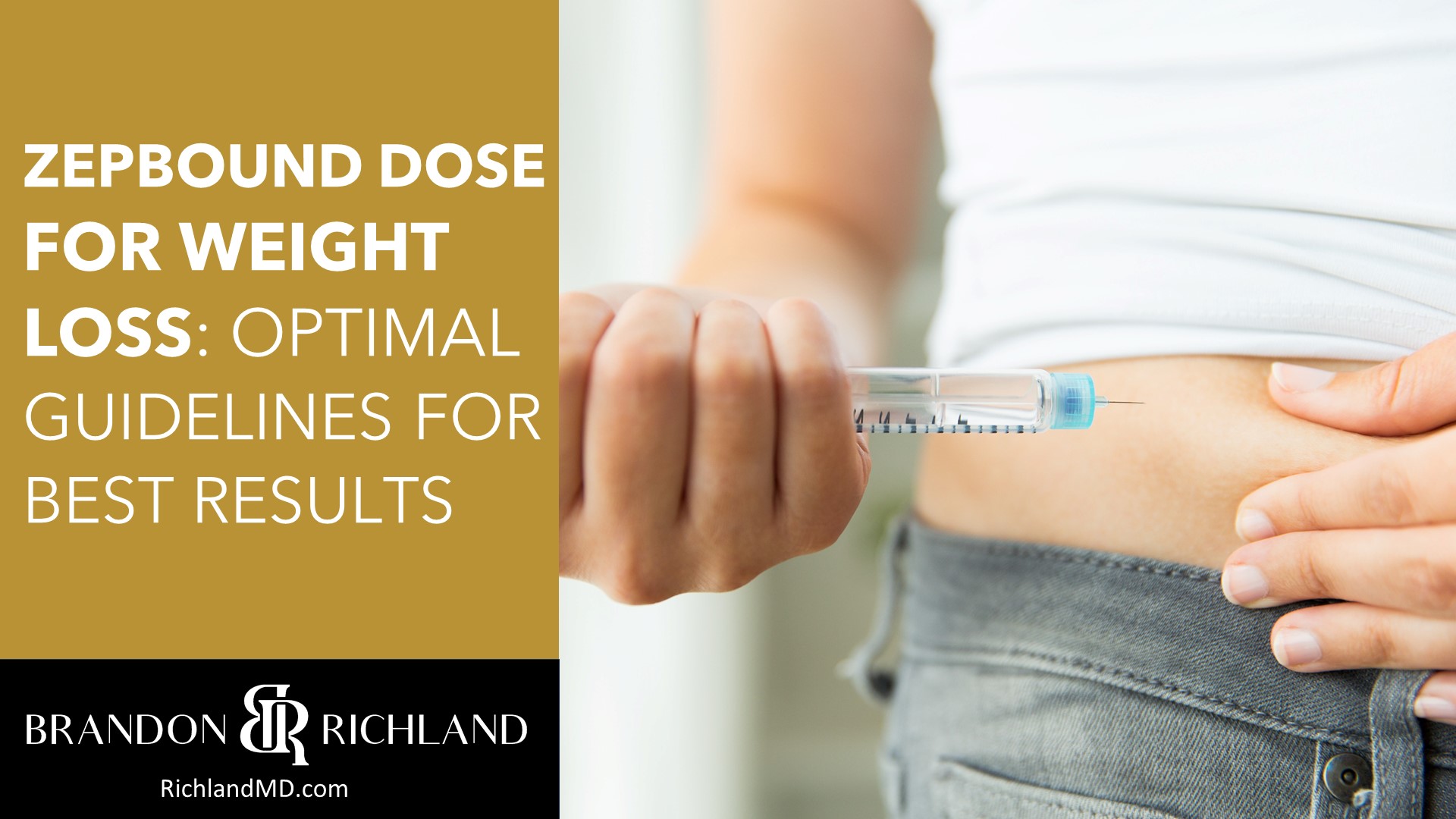Published by Dr. Brandon Richland, MD

Zepbound is emerging as a significant player in the fight against obesity and overweight, drawing attention for its potential in weight management. With obesity being a widespread concern, affecting millions worldwide, the arrival of new treatments is pivotal.
Zepbound’s active ingredient, known scientifically as tirzepatide, operates on the principles of mimicking natural hormones to regulate appetite and calorie intake, thus promoting weight loss.
The dosing of Zepbound for weight loss begins conservatively, to allow the body to adjust to the medication. According to the official Zepbound dosing guidelines, the treatment starts with a 2.5 mg injection once weekly and can be escalated gradually under medical supervision. This titrated approach is tailored to individual patient needs, aiming to maximize effectiveness while minimizing potential side effects.
Key Takeaways of Zepbound Dose for Weight Loss
- Zepbound, containing tirzepatide, is a medication that helps regulate appetite and calorie intake.
- Initial dosing of Zepbound starts at 2.5 mg per week and can be adjusted based on patient response.
- The titrated dosing approach helps balance efficacy with safety in weight loss management.
Understanding Zepbound
Zepbound emerges as a significant player in the market for pharmaceutical solutions aimed at weight management, leveraging an active ingredient with a unique mechanism distinct from other GLP-1 receptor agonists.
What Is Zepbound?
Zepbound is a prescription medication designed to assist adults with obesity or excess weight accompanied by weight related health issues to lose weight and maintain weight loss. It should be used in conjunction with a reduced calorie diet and increased physical activity.

Active Ingredient Profile
The active ingredient in Zepbound is tirzepatide, which differs from other active substances found in similar weight management medications. Unlike semaglutide, the active ingredient in well-known drugs like Ozempic and Wegovy, tirzepatide operates through a dual mechanism that offers a distinct approach.
Mechanism of Action
Zepbound harnesses the effects of tirzepatide that functions as a GLP-1 receptor agonist. This entails stimulating the release of insulin while also delaying gastric emptying, contributing to the regulation of blood sugar levels and appetite suppression.
Potential Benefits of Zepbound
Zepbound is a prescription medication that has shown promise in managing weight and improving health outcomes related to obesity and type 2 diabetes. It operates through appetite regulation and may have a significant impact on an individual’s diet and weight management practices.
Weight Management Efficacy
Researchers have found that Zepbound can lead to substantial weight loss, with some studies indicating the possibility of a 22% reduction in total body weight over a period of 72 weeks. This level of efficacy offers promise for those struggling with obesity, providing them with a new tool in their weight management arsenal.
Effects on Type 2 Diabetes
In addition to its weight loss benefits, Zepbound has an impact on patients with type 2 diabetes. The medication works by slowing down the movement of food from the stomach to the small intestine, potentially improving blood sugar levels and providing better glycemic control, which is crucial in managing diabetes.
Appetite Regulation and Dietary Impact
Zepbound’s mechanism of action includes decreasing one’s appetite, which, in turn, can lead to a reduced caloric intake and better dietary choices. By feeling fuller sooner and for longer periods, individuals may find it easier to manage their eating habits and maintain a healthier diet, contributing to improved weight management outcomes.
Indications and Dosage
Zepbound is a weight management medication intended for adults with obesity or overweight conditions. It is critical that they adhere to the prescribed dosage for safe and effective weight loss.
Recommended Dosage for Weight Loss
- Initiation: The treatment with Zepbound begins with a starting dosage of 2.5 mg, injected subcutaneously once a week. This initiation dose is specifically for the first 4 weeks and is not meant for long-term management.
- Maintenance: After the initial 4 weeks, the dosage should be increased to a maintenance dose of 5 mg once a week, subcutaneously. Depending upon individual patient responses and tolerability, the dosage may be further adjusted to higher maintenance doses of 10 mg or 15 mg weekly, which have been associated with significant weight loss over time.
Dosage Adjustments for Adults
- Dosage Increase: It is typically recommended to increase the dose of Zepbound from the initial 2.5 mg after the first month. Patients should step up to a 5 mg dose once weekly, with the possibility of additional increases if well-tolerated to reach the desired weight loss goal.
- Missed Dose: If a dose is missed, it should be taken as soon as possible within 4 days. If more than 4 days have passed, it is advised to skip the missed dose and resume the regular dosing schedule. Adjusting the injection day is acceptable, provided there is a minimum gap of 72 hours between doses to maintain proper levels of the drug in the body as indicated on the Zepbound usage guidelines.
Administration Guidelines
When administering Zepbound for weight loss, patients should follow the recommended dosage carefully and select the proper injection site to ensure the effectiveness of the medication.
How to Administer Zepbound
Zepbound is to be injected subcutaneously, meaning the medication is administered into the fatty layer beneath the skin. This method allows for the drug to be absorbed slowly and continuously. For optimal results, patients must adhere to their prescribed dosage schedule. The drug typically comes in pre-filled pens, and one should use a new pen for each injection to maintain hygiene and prevent infection.
Choosing the Injection Site
The injection site is crucial for both the efficacy of the medication and the comfort of the patient. Zepbound should be injected into one of the following areas:
- Thigh: The front and outer portions are preferred. Patients should avoid injecting near the inner thigh due to sensitivity and higher vascularity.
- Upper arm: If self-injecting, the patient may need assistance as this can be a difficult area to reach. Use the fatty area on the back of the arm.
- Abdomen: Choose a site at least two inches away from the belly button. The abdominal area should not have any scars, bruises, or irritation.
Patients should rotate injection sites with each dose to prevent skin issues such as irritation or lipodystrophy. They should also avoid injection site reactions into areas where the skin is tender, bruised, red, or hard.
Healthy Living with Zepbound
Incorporating Zepbound into a healthy living plan involves a balanced approach of a tailored diet and exercise regimen. Achieving optimal results requires dedication to both dietary modifications and consistent physical activity.
Diet and Exercise Recommendations
- Diet: Individuals prescribed Zepbound should follow a reduced-calorie diet. This involves choosing nutritionally dense foods and maintaining a caloric intake that supports gradual weight loss. A standard suggestion might be:
- Fruits and vegetables: Aim for at least five servings a day.
- Whole grains: Include whole grains like brown rice and whole wheat bread to increase fiber intake.
- Lean proteins: Opt for lean meats, fish, and plant-based proteins to support muscle health without excess calories.
- Exercise: Alongside Zepbound, regular physical activity is critical. It’s recommended to incorporate:
- Cardiovascular exercises: such as brisk walking, cycling, or swimming for at least 150 minutes per week.
- Strength training: Activities like weightlifting or bodyweight exercises should be done on two or more days each week for all major muscle groups.
Lifestyle Adjustments for Optimal Results
- Routine: Establishing a consistent routine for both diet and exercise can lead to more sustainable weight loss and health improvements.
- Set specific meal and snack times.
- Schedule workouts as one would any other important appointment.
- Support: Engaging with a support network can enhance motivation and provide accountability.
- Seek the guidance of a registered dietitian to personalize dietary plans.
- Join a fitness group or find an exercise buddy to stay committed.
Safety Profile
When considering Zepbound for weight loss, one must be mindful of its safety profile. This includes the range of side effects, management of adverse reactions, and taking necessary precautions.
Common Side Effects
Zepbound has a spectrum of side effects that patients may experience during treatment. Common adverse effects include:
- Nausea: This is a frequently reported issue which tends to diminish over time.
- Diarrhea and Constipation: Gastrointestinal disturbances are common but often manageable.
- Vomiting: Some patients may experience vomiting as a response to medication.
- Gas: An increase in gas is another side effect that a patient may encounter.
- Low Blood Sugar: Particularly in patients with diabetes, Zepbound can cause hypoglycemia.
- Hair Loss: There have been reports of hair thinning or loss associated with medication use.
By understanding these side effects, patients can be better prepared and address any concerns with their healthcare provider.
Managing Adverse Reactions
If a patient experiences adverse reactions to Zepbound, such as allergic reactions or kidney problems, it is important for healthcare providers to adjust treatment plans accordingly.
- Allergic Reactions: Prompt identification and discontinuation of medication are key if severe allergic reactions occur.
- Kidney Problems: Regular monitoring of kidney function may help manage and mitigate any related issues.
Open communication between patient and provider is essential to manage these reactions effectively.
Important Precautions
It’s essential for patients and healthcare providers to be aware of several crucial precautions:
- Pancreatitis: Patients should report any severe abdominal pain as this may be a sign of pancreatitis.
- Thyroid Tumor: As Zepbound may increase the risk of thyroid C-cell tumors, it is not recommended for patients with a personal or family history of medullary thyroid carcinoma or patients with Multiple Endocrine Neoplasia syndrome type 2.
Patients should always inform their healthcare provider of any existing medical conditions to determine the suitability of Zepbound for their weight loss regimen.
Contraindications and Cautions
When considering Zepbound for weight loss, it is imperative to acknowledge specific contraindications and exercise caution in particular situations. Each individual’s medical background can deeply influence the safety and efficacy of this medication.

Zepbound Use in Special Populations
Pregnancy and Breastfeeding: Zepbound is not recommended for use during pregnancy, and women who are breastfeeding should also be cautious.
Patients with Type 2 Diabetes: While Zepbound’s effect on weight loss can be beneficial for individuals with type 2 diabetes, its interaction with other diabetes medications, especially sulfonylureas, requires close monitoring to prevent hypoglycemia.
Interactions with Other Medications
- Birth Control: Patients using hormonal birth control should consult their healthcare provider as weight changes can affect the efficacy of birth control pills.
- Allergic Reactions: Before starting Zepbound, individuals should inform their healthcare provider of any previous allergic reactions to GLP-1 receptor agonists or GIP to prevent potential adverse effects.
- Medication Interactions: Those prescribed other medications should have their treatment plans reviewed to avoid unintended interactions with Zepbound, which can lead to side effects or reduced effectiveness of either medication.
Regulatory Information
Zepbound, a prescription medication for weight loss, has undergone rigorous scrutiny to ensure its safety and efficacy for public use. Key regulatory milestones include FDA approval based on comprehensive clinical trials and the presence of detailed usage instructions on prescription labels.
FDA Approval and Monitoring
The U.S. Food and Drug Administration (FDA) granted approval for Zepbound (tirzepatide) injection for chronic weight management. Prior to approval, the FDA evaluated the safety and efficacy of Zepbound in adults with obesity or overweight in conjunction with a reduced-calorie diet and increased physical activity.
The FDA approval process includes rigorous review of clinical trial data to ensure the medication meets the necessary safety standards. However, the FDA also mandates that Zepbound should not be used in individuals with a personal or family history of medullary thyroid carcinoma or in those with multiple endocrine neoplasia syndrome type 2.
Understanding the Prescription Label
Prescription labels for Zepbound contain crucial information to guide safe usage. They indicate the recommended starting dosage of 2.5 mg administered subcutaneously once weekly, with a note that this initial dose is not for chronic weight management.
Following four weeks of treatment, the dosage can be increased as per medical guidelines. This dosage information helps healthcare professionals and patients adhere to safe and effective treatment protocols for weight loss while monitoring for any potential side effects.
Post-Treatment Considerations
After patients stop treatment with Zepbound, monitoring their health and maintaining lifestyle changes are crucial to sustaining weight loss. These post-treatment considerations ensure that the progress achieved isn’t lost and that individuals continue to manage their weight effectively.
Monitoring Health After Zepbound
It’s important to regularly check one’s BMI and health markers after discontinuing Zepbound to detect any potential weight gain early and address it promptly. They should also be aware of the risks associated with diabetic retinopathy, a condition that can be exacerbated by rapid weight changes. Regular consultations with a healthcare provider can help manage these risks effectively.
- BMI Tracking: Keep monthly records of body mass index to monitor changes.
- Health Screenings: Schedule annual eye exams to check for signs of diabetic retinopathy.
Lifestyle After Achieving Weight Loss Goals
Maintaining a healthy lifestyle after meeting weight loss goals with Zepbound is vital for long-term weight management.
- Diet: Focus on a balanced diet rich in nutrients and low in empty calories to prevent weight regain.
- Exercise: Engage in at least 150 minutes of moderate aerobic activity weekly to maintain weight loss.
Frequently Asked Questions About Zepbound Dose for Weight Loss
1. What Are The Recommended Dosages For Weight Loss Medications Similar To Zepbound?
Medications in the same category as Zepbound generally start at a low dose as 2.5 mg and may be increased based on a patient’s response to the treatment.
2. How Does One Typically Determine The Appropriate Dosage Of A Weight-Loss Drug?
The appropriate dosage of an average weight loss using Zepbound is determined by a healthcare provider, taking into account the individual’s health profile, weight loss goals, and medication tolerance.
3. Can You Tell Me The Common Side Effects Of Medications Used For Losing Weight?
Common side effects of weight loss medications can include nausea, diarrhea, constipation, and in some cases, an increased heart rate. It’s important for users to be aware of these and discuss potential side effects with their healthcare provider.
4. What Are The Key Factors To Consider Before Starting A Weight Loss Medication Regimen?
Before starting a medication like Zepbound, factors to consider include current health conditions, possible drug interactions, and the patient’s overall weight loss plan.
5. How Long Does It Typically Take To See Noticeable Results From A Weight Loss Medication?
Results from weight loss medications can vary; however, it might take several weeks to months to see noticeable results. It is crucial to talk to your healthcare provider to monitor progress.
6. Are There Any Lifestyle Changes One Should Adopt While Taking Weight Loss Prescriptions?
While taking a prescription for weight loss, lifestyle changes such as a balanced diet and regular exercise are often recommended to enhance the effectiveness of the medication.

Conclusion and Summary of Zepbound Dose for Weight Loss: Optimal Guidelines for Best Results
Zepbound represents a significant advancement in chronic weight management for patients with obesity and related health conditions. By working closely with healthcare providers, patients can effectively use Zepbound to achieve their weight loss goals while being mindful of potential side effects and risks.
Regular consultation, adherence to dosage instructions, and understanding the comprehensive nature of this drug class can lead to a successful and healthy weight management journey. As with any medical treatment, the key to success lies in informed and proactive patient engagement.
Please note that this article is intended for informational purposes only and should not be construed as medical advice. Before making any changes to your treatments, please consult with your healthcare provider to discuss the appropriateness and safety of such changes.
Ready For Your First-Class Cosmetic Experience in Orange County (OC) California (CA)?
Are you located in one of these Orange County (OC) / Southern California cities?
Aliso Viejo, Anaheim, Brea, Buena Park, Costa Mesa, Coto de Caza, Cypress, Dana Point, Fountain Valley, Fullerton, Garden Grove, Huntington Beach, Irvine, La Habra, La Palma, Laguna Beach, Laguna Hills, Laguna Niguel, Laguna Woods, Ladera Ranch, Lake Forest, Los Alamitos, Mission Viejo, Newport Beach, Orange, Placentia, Rancho Santa Margarita, San Clemente, San Juan Capistrano, Santa Ana, Seal Beach, Stanton, Tustin, Villa Park, Westminster, or Yorba Linda?
Plastic Surgeon Dr. Brandon Richland, MD and our Cosmetic Aesthetics Team are ready to help you look and feel your absolute best.
Elevate your confidence and self esteem levels to unfathomable new heights!
Schedule your in-person consultation in our modern and luxurious offices in either Fountain Valley, CA (Main HQ) or our Newport Beach, CA office.
Do you live outside of Southern California or short on time? For your convenience, Virtual Consultations are also available.
Our warm and engaging Team of carefully selected Aesthetics Professionals will make you feel calm, cool, collected, and right at home throughout your entire consultation and surgery process.
Schedule Your Aesthetics Consultation here, or call us directly at 949-867-4496 today.
About the Author

Dr. Brandon Richland, MD is a respected Board Certified Licensed Plastic Surgeon in Orange County / Southern California specializing in cosmetic and reconstructive surgeries.
Driven by his passion for medicine, Dr. Richland obtained his Doctor of Medicine (M.D.) degree from the prestigious program at Saint Louis University (SLU) School of Medicine in 2013. His exceptional skills were recognized when he received the McGraw Hill / Lange Medical Student Academic Achievement Award, and graduated top of his class with Honors. For his undergraduate degree, he attended University of California, Los Angeles (UCLA) and graduated with Honors in 2009.
To further enhance his surgical expertise, Dr. Richland completed his Residency in Plastic Surgery at the University of California, Irvine (UCI) from 2013 to 2019 earning the Academic Achievement Award twice during this period. A total of 14 years in dedicated schooling and medical residency.
Dr. Richland is actively involved with healthcare and medical societies, as a Diplomate of the American Board of Plastic Surgery, a member of the American Society of Plastic Surgeons, American Society of Aesthetic Plastic Surgeons, and the California Society of Plastic Surgeons.
Contact Dr. Richland today by visiting RichlandMD.com, scheduling a cosmetic consultation, or by calling 949-867-4496 directly.
Cover Image Credit: Dolgachov / 123RF.com (Licensed). Photo Illustration by: Dr. Brandon Richland, MD.










